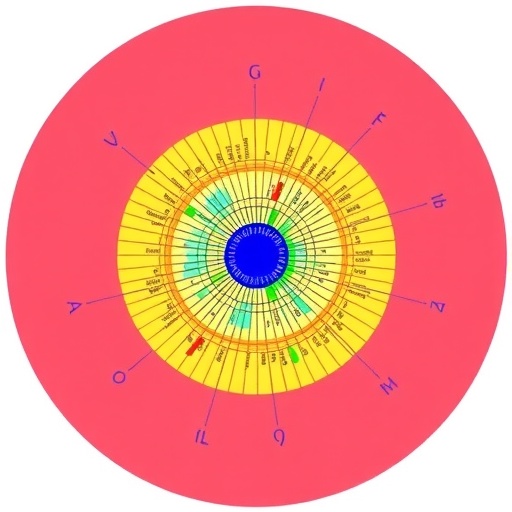In a landmark scientific breakthrough, an international consortium of researchers has unveiled a comprehensive molecular map detailing how blood proteins fluctuate across a staggering spectrum of 59 diseases. This pioneering effort, published in the prestigious journal Science, could revolutionize diagnostic medicine by enabling blood tests to distinguish disease-specific signals from generalized inflammatory responses. Spearheaded by the Human Protein Atlas project at the KTH Royal Institute of Technology in Stockholm, this study leverages advanced proteomic profiling and cutting-edge machine learning algorithms to decode the complex molecular fingerprints each disease imprints on the human bloodstream.
The Human Disease Blood Atlas represents an unprecedented attempt to chart the proteomic landscape modulated by aging and pathological states spanning cancer, cardiovascular disorders, autoimmune diseases, and beyond. By analyzing thousands of proteins circulating in human plasma, the research delineates unique molecular profiles that evolve throughout an individual’s life — from the dynamic shifts seen in childhood to a surprisingly stable adult baseline. This baseline provides a critical reference framework, enabling clinicians to identify subtle deviations that may herald disease onset long before clinical symptoms emerge.
Distinguished by its comprehensive scope, the study incorporates a comparative approach where multiple diseases are analyzed side-by-side rather than in isolation. This method allows researchers to disentangle universal biomarkers of inflammation — often false alarms — from genuinely disease-specific molecular perturbations. According to Professor Mathias Uhlén, director of the Human Protein Atlas project, this nuanced differentiation is pivotal for developing blood tests with clinical specificity, minimizing misclassification risks common in current diagnostic tools.
The innovative application of machine learning was instrumental in handling the vast and intricate proteomic datasets. These algorithms identified patterns that conventional statistical techniques might overlook, elevating the reproducibility and reliability of biomarker discovery. María Bueno Álvez, lead author and PhD candidate at KTH, underscores how this methodological advancement addresses a critical bottleneck in biomarker research: the high failure rate of reproducibility in studies that traditionally compare diseased cohorts only against healthy controls.
This quantum leap in understanding the circulating proteome is pivotal not only for diagnostics but also for therapeutic innovation. Shared molecular features detected across multiple diseases offer promising universal targets for future drug development, diagnostic panels, and prognostic tools. The atlas thus represents a treasure trove of biomarkers that transcend individual diseases, illuminating pathways common to various pathological processes such as inflammation and tissue damage.
One of the most striking revelations from the data involves the temporal dynamics of proteomic changes preceding cancer diagnoses. Specific proteins exhibited marked alterations well before clinical diagnosis, suggesting a yet untapped potential for liquid biopsies in early cancer detection. This advancement could shift cancer prognosis profoundly by facilitating intervention during preclinical stages when treatment responses are markedly better.
The atlas also elucidates organ-specific proteomic signatures, clustering diseases by affected organ systems. For example, conditions related to liver dysfunction presented distinct molecular fingerprints divergent from those driven by systemic inflammation. This organ-centric view enhances the precision of diagnostic assays, enabling more targeted and effective clinical responses.
The robustness of the Human Disease Blood Atlas stems from its collaborative fabric, weaving together expertise from over 100 research groups worldwide and leveraging the state-of-the-art facilities at SciLifeLab in Stockholm. The project exemplifies how large-scale interdisciplinary efforts and technological innovations can jointly unlock new frontiers in personalized medicine.
This study’s approach challenges the conventional paradigm that relies heavily on control versus disease comparisons, which often yield irreproducible and misleading biomarkers due to overlapping protein expression changes across diseases. Instead, by deploying a diverse disease panel, the atlas offers a more realistic and clinically relevant framework for biomarker validation, capable of withstanding the complexities and heterogeneity encountered in real-world patient populations.
Ultimately, this human pan-disease blood atlas sets the stage for next-generation clinical blood tests that combine molecular precision with machine learning-enhanced analytics. Such tests hold the promise to transform early diagnosis, disease monitoring, and treatment personalization, thereby improving patient outcomes and reducing healthcare costs associated with misdiagnosis and delayed intervention.
As the medical community strives for a new era of precision diagnostics, the integration of proteomics and computational biology embodied in this atlas stands as a cornerstone. Future research building on these findings will likely explore longitudinal, large-cohort studies to validate and extend these molecular fingerprints, cementing proteomic blood profiling’s role in routine clinical practice.
In sum, the unveiling of this comprehensive molecular atlas signals a paradigm shift in biomarker science. By revealing the intricate, disease-specific signatures embedded within the circulating proteome, it provides an essential tool for clinicians and researchers alike, bridging the gap between molecular insights and tangible clinical benefits.
Subject of Research: Molecular profiling of circulating blood proteins to differentiate disease-specific markers from general inflammation signals across multiple human diseases.
Article Title: A human pan-disease blood atlas of the circulating proteome
News Publication Date: 9-Oct-2025
Web References: https://doi.org/10.1126/science.adx2678
Image Credits: Gustav Ceder
Keywords: proteomics, blood biomarker, inflammation, disease-specific signals, Human Protein Atlas, machine learning, cancer detection, autoimmune diseases, cardiovascular disease, molecular fingerprinting, diagnostic biomarkers, liquid biopsy




